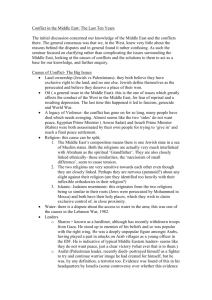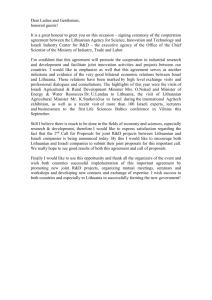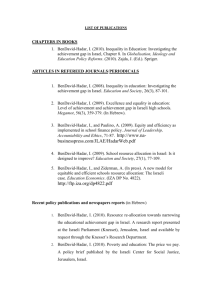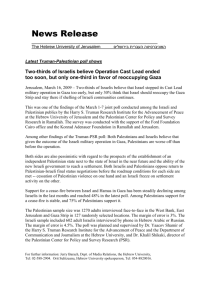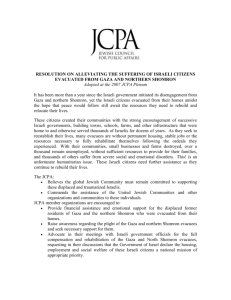1 Adam S. Hofri-Winogradow, 16 Edinburgh Law Review (2012) 125
advertisement
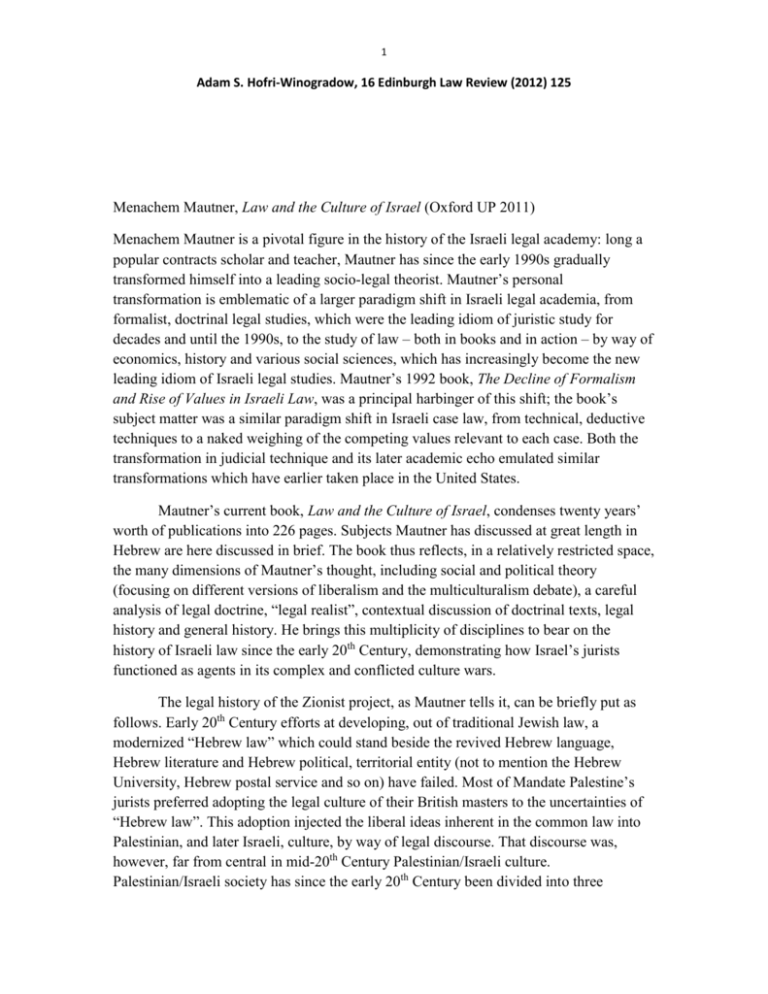
1 Adam S. Hofri-Winogradow, 16 Edinburgh Law Review (2012) 125 Menachem Mautner, Law and the Culture of Israel (Oxford UP 2011) Menachem Mautner is a pivotal figure in the history of the Israeli legal academy: long a popular contracts scholar and teacher, Mautner has since the early 1990s gradually transformed himself into a leading socio-legal theorist. Mautner’s personal transformation is emblematic of a larger paradigm shift in Israeli legal academia, from formalist, doctrinal legal studies, which were the leading idiom of juristic study for decades and until the 1990s, to the study of law – both in books and in action – by way of economics, history and various social sciences, which has increasingly become the new leading idiom of Israeli legal studies. Mautner’s 1992 book, The Decline of Formalism and Rise of Values in Israeli Law, was a principal harbinger of this shift; the book’s subject matter was a similar paradigm shift in Israeli case law, from technical, deductive techniques to a naked weighing of the competing values relevant to each case. Both the transformation in judicial technique and its later academic echo emulated similar transformations which have earlier taken place in the United States. Mautner’s current book, Law and the Culture of Israel, condenses twenty years’ worth of publications into 226 pages. Subjects Mautner has discussed at great length in Hebrew are here discussed in brief. The book thus reflects, in a relatively restricted space, the many dimensions of Mautner’s thought, including social and political theory (focusing on different versions of liberalism and the multiculturalism debate), a careful analysis of legal doctrine, “legal realist”, contextual discussion of doctrinal texts, legal history and general history. He brings this multiplicity of disciplines to bear on the history of Israeli law since the early 20th Century, demonstrating how Israel’s jurists functioned as agents in its complex and conflicted culture wars. The legal history of the Zionist project, as Mautner tells it, can be briefly put as follows. Early 20th Century efforts at developing, out of traditional Jewish law, a modernized “Hebrew law” which could stand beside the revived Hebrew language, Hebrew literature and Hebrew political, territorial entity (not to mention the Hebrew University, Hebrew postal service and so on) have failed. Most of Mandate Palestine’s jurists preferred adopting the legal culture of their British masters to the uncertainties of “Hebrew law”. This adoption injected the liberal ideas inherent in the common law into Palestinian, and later Israeli, culture, by way of legal discourse. That discourse was, however, far from central in mid-20th Century Palestinian/Israeli culture. Palestinian/Israeli society has since the early 20th Century been divided into three 2 Adam S. Hofri-Winogradow, 16 Edinburgh Law Review (2012) 125 separate blocs, each with distinct views regarding the appropriate character of state and society: devout, observant Jews, non-observant Jews, and the Arab community. While the Israeli state has, on having in 1948 declared its independence, adopted the existing law, left behind by the British Mandate regime, as its own, not even Israel’s non-observant bloc then adhered to the liberal values implicit in Palestine/Israel’s British-inspired law. Sensing their weak position, Israel’s lawyers took care, until the late 1970s, to hide the values implicit in their jurisprudence behind a technical, deductive, purportedly ‘valueneutral’ façade. This façade was removed starting in the early 1980s, in response to the end of the non-observant Jewish public’s long-unchallenged dominance in Israeli politics and culture. Israel’s observant Jews have been gathering political and cultural power since the 1970s. By that time, the non-observant Jewish public has transformed its value system from the collectivist, socialist ethos of early statehood to an increasingly liberal individualism. The value system implicit in Israeli law has thus come, as length, to coalesce with that of one of Israel’s three population blocs – the non-observant Jewish public – just as that public started its long (and continuing) political freefall. As nonobservant Jewish Israelis gradually realized that their political fortunes were declining, they attempted to use the Supreme Court to reign in the legislature and the executive, now controlled by their right wing and observant adversaries. And the Court, largely manned with non-observant Jews, complied. It complied by a radical extension of standing and justiciability, coupled with vigorous judicial review techniques which scrutinized executive action, and later legislative action as well, for their reasonableness and proportionality. At times, the Court could scale truly colossal heights of judicial activism, at least so far as rhetoric was concerned. Aharon Barak, Chief Justice from 1995-2006, wrote on more than one occasion that “law has no limits. The whole earth is full of law” (quoted in Mautner, pp. 3, 60). His Court did at times act on this rhetoric, restraining legislative and executive action according to vague standards largely inspired by Justices’ (often liberal) values. As Mautner and Ran Hirschl point out, Israeli adjudicative activism was an attempt by a declining social bloc to slow down its decline by subjecting its socio-political rivals’ attempts at capitalizing on their elections victories to rigorous judicial review for reasonableness. This judicialized delaying strategy was quite effective for more than 20 years, from 1980 until 2005 or so. By the mid-1990s, however, observant Jewish Israelis were remonstrating against the Court’s increasingly liberal decisions. By the mid-2000s, non- 3 Adam S. Hofri-Winogradow, 16 Edinburgh Law Review (2012) 125 observant Jewish Israelis themselves, having secured themselves a new power base – increasing wealth and global business connections – began relaxing their long-held support for the Court’s activist stance. As could be gathered from the above précis, Mautner’s history of Israeli judicial activism is critical. While Israeli legal academics – many of them non-observant Jews – have at times been enchanted by the Israeli Supreme Court’s bold approach, scholarly critique of that approach is now nearly 20 years old. An important early critical signpost was a pair of 1994 articles by Mautner and Ronen Shamir, entitled “The Reasonableness of Politics” and “The Politics of Reasonableness” respectively. In Mautner’s view, the multiple, deep and complex conflicts which have for generations marred relations between the groups which make up Israeli society cannot be administered (much less resolved) by subjecting the results of political processes to judicially-controlled standards. The book concludes with a plea for social and political investment in the construction of an Israeli ‘common good’ – some core of values which can be common to all Israelis, and which may serve as a foundation for the entrenchment of a civic peace. Like some other Israeli lawyers and legal academics, then, Mautner has come to realize the limits of law’s power to work social and political change (or stasis, as the case may be). His important book can be of interest for non-Israeli readers as a demonstration of law’s limits: of how even the most talented, committed, brilliant justices cannot, through their judicial decisions, delay an ongoing demographical, social, cultural and political transformation for more than a limited time.



